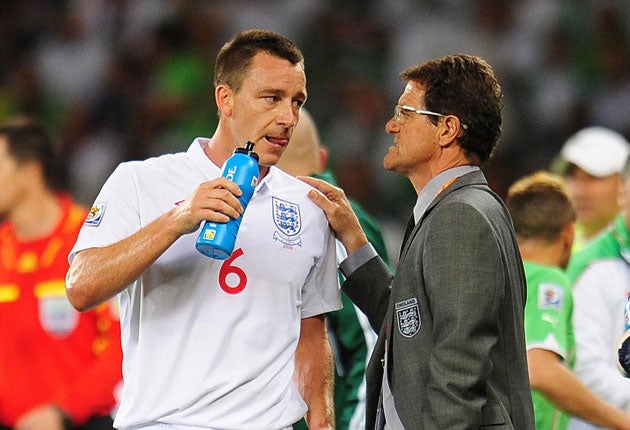Jordaan: Player fatigue to blame for poor show

Your support helps us to tell the story
From reproductive rights to climate change to Big Tech, The Independent is on the ground when the story is developing. Whether it's investigating the financials of Elon Musk's pro-Trump PAC or producing our latest documentary, 'The A Word', which shines a light on the American women fighting for reproductive rights, we know how important it is to parse out the facts from the messaging.
At such a critical moment in US history, we need reporters on the ground. Your donation allows us to keep sending journalists to speak to both sides of the story.
The Independent is trusted by Americans across the entire political spectrum. And unlike many other quality news outlets, we choose not to lock Americans out of our reporting and analysis with paywalls. We believe quality journalism should be available to everyone, paid for by those who can afford it.
Your support makes all the difference.As the World Cup finalists completed their final training sessions at Soccer City last night, Danny Jordaan, the influential chief executive of the Local Organising Committee, admitted that player fatigue has had an effect on the competition and called for a longer rest period before the 2014 finals.
A number of countries – England prominent among them – have blamed long domestic seasons for injuries and sub-standard performances that have marred the tournament.
"How many matches can the body of a footballer bear during the season?" Jordaan asked. "You wonder why, say, [Lionel] Messi and [Wayne] Rooney did not score a goal. In January and February we had the African Cup of Nations, then players went straight back to play in their leagues and the Champions' League and came to the World Cup. Is it reasonable to expect players like Michael Essien and Didier Drogba to come here and perform at their best? I think not. I think it's too much. It needs another look."
In what may have been a coded message to England, he also suggested that the future lies with teams of young players. "The World Cup has clearly shown that teams with a strong contingent of young players made it in the end," he said. "Teams with older players are all at home. The game nowadays is very fast."
Disappointed by the performances of the six African teams, of whom only Ghana progressed beyond the group stage, Jordaan believes they suffered from having their main continental cup competition staged five months before the World Cup. From 2013, the African Nations' Cup will be moved so that there is no longer a clash.
He was far more positive about all other aspects of the tournament, which, he said "brought a huge sense of pride" to all of Africa. The organisers claim that more than three million people have visited the fan festivals in host cities and that attendances for the tournament will be the highest since 1994, despite gaps caused by companies not selling their seats. "The teams have all been very complimentary about the stadiums, the transport and the training camps," Jordaan said.
On crime and security he said: "I think the security forces have done an amazing job. But we've now hosted 148 major events in South Africa so I hope we've made the point. We established special criminal courts, trains with police stations at the back of them, for swift, efficient justice. South Africans are saying they want those to remain and the Justice Minister has said they will see if they can become permanent."
Jordaan added that the World Cup had shown how South Africa has changed. "People were [once] told they were inferior, which was a huge psychological barrier they have crossed. Twenty years ago, black and white couldn't sit together in the same stadium or restaurant or school."
He also confirmed that Uefa's president, Michel Platini, was "fine" after spending Friday night in hospital. He fainted while dining in Johannesburg with former coaches Gérard Houllier and Andy Roxburgh. Platini had been suffering from flu during the week.
Meanwhile, the Airports Company of South Africa has been heavily criticised for offering only 400 rand (£35) in compensation to hundreds of supporters who missed Spain's semi-final against Germany on Wednesday night because of chaos at Durban airport. Acsa blamed eight private aircraft which refused to move and free up landing space.
Man in the middle: Taylor hails Webb as the 'best referee Britain has produced'
Jack Taylor, the last Briton to referee the World Cup final, 36 years ago, will be at Soccer City tonight to see Howard Webb take charge. He has been flown to South Africa by the Premier League. On his arrival, Taylor said: "I remember speaking to [the Premier League chief executive] Richard Scudamore shortly after Howard received the call that he was to start officiating Premier League games and I told him he had someone who'd go to the top. I believe he's the best referee this country has produced." Webb, speaking yesterday, said he and his assistants, Darren Cann and Mike Mullarkey, would not be afraid to emulate the kind of "courageous decision" Taylor made in awarding Holland a penalty in the first minute of the 1974 final. The fathers of Webb and his assistants are all former referees – all three will be at the final.
Steve Tongue
Join our commenting forum
Join thought-provoking conversations, follow other Independent readers and see their replies
Comments